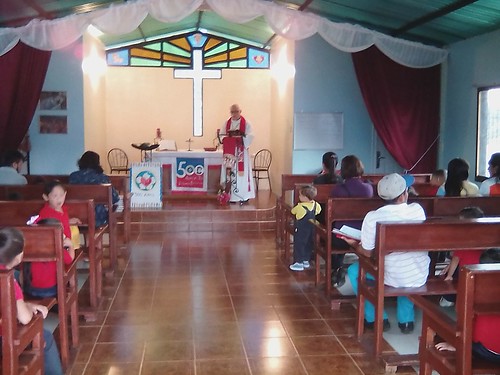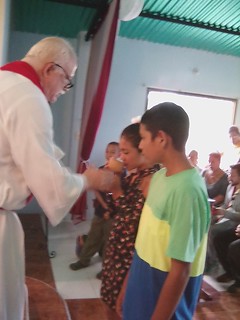So what's the best film about Martin Luther and the Reformation? Martin Luther (1953) or Luther (2003)? The 2017 PBS documentary, Martin Luther: The Idea That Changed The World or its Wisconsin Synod remix, Return to Grace: Luther's Life and Legacy?
We did not have much
of a choice. The 1953 film is not widely available here, nor is the
2017 documentary in either version. The 2003 film was shown in
Venezuelan movie theaters and is available on DVD. In fact, I have a
copy that I bought in Barquisimeto. We showed clips from that one as
part of celebration of the 500th anniversary of the Reformation,
first on October 21 and also on October 28.
I have fond memories
of the 1953 film, having seen many screenings in church basements as
a child. As an adult, living in Topeka, Kansas, from 1983 to 1986, I
remember the local PBS station showing the film every year during the
last week in October. There was an introduction by David
Soul, who some may remember from the classic 1970s television
series, “Starsky and Hutch”. The actor also is the son of Dr.
Richard Solberg, a Lutheran minister who served as a religious
affairs advisor to the U.S. High Commission in Berlin and as senior
representative for the Lutheran World Federation (LWF) refugee relief
agency that was involved in the post World War II reconstruction of
Germany.
 “Martin Luther”
still has its strong points, I think, but there are some things that
make it less than the best introduction to the Reformation for
contemporary audiences. It's in black-and-white, of course, and
slow-paced, with less fluid camera work than more current films. Then
there's the curious fact that the British-made film has all the
people of higher education and status speak Oxford English, while the
peasants speak with working-class accents. That's something that's
hard for people not raised with British class consciousness to
appreciate, even if one speaks English in the first place.
“Martin Luther”
still has its strong points, I think, but there are some things that
make it less than the best introduction to the Reformation for
contemporary audiences. It's in black-and-white, of course, and
slow-paced, with less fluid camera work than more current films. Then
there's the curious fact that the British-made film has all the
people of higher education and status speak Oxford English, while the
peasants speak with working-class accents. That's something that's
hard for people not raised with British class consciousness to
appreciate, even if one speaks English in the first place. The 2003 film has
its weaknesses, too. Mainly, I think, because it tries to present a
broader historical context, yet within the confines of a two-hour
featur film, it presents too much information and yet not enough. Who
are all these people, and what is their relationship to Martin
Luther? It's hard to keep track, if you do not already know. I have
heard the 2017 documentary is even better, but I have not had the
chance to see it.
The 2003 film has
its weaknesses, too. Mainly, I think, because it tries to present a
broader historical context, yet within the confines of a two-hour
featur film, it presents too much information and yet not enough. Who
are all these people, and what is their relationship to Martin
Luther? It's hard to keep track, if you do not already know. I have
heard the 2017 documentary is even better, but I have not had the
chance to see it.
At any rate, we
showed what I think are the best parts of the 2003 film: Luther´s
pilgrimage to Rome in 1511; the entire segment on Tetzel's sale of
indulgences and Luther's posting of the 95 Theses; the Diet of Worms;
and the Presentation of the Augsburg Confession. We invited people
from the community, and the time between the clips allowed for plenty
of discussion about issues which still divide us from the Roman
Catholic church (penance, purgatory and the papacy), and the enduring
significance of “Scripture alone”, “faith alone” and “grace
alone”.
Also, in the week
before our special Reformation Day service on October 29, Luz Maria
presented vacation Bible school lessons emphasize salvation by faith
and grace in place of her regular afterschool tutoring. The preschool
children heard of the importance of everyone being able to read the
Bible in their own language and made a representation of Luther's
seal.
During an opening
prayer service on Monday, October 30, I spoke to the families of our
preschool children and their teachers about impact of the Reformation
on education. The rallying cry of “Scripture alone” resulted in
the translation of the Bible into many languages; the motive for
printing copies of the Bible in the common tongue through the use of
Gutenberg's moveable-type press; and the promotion of public
education (public in the sense of teaching all to read and write, as
well as other useful skills, not just a fortunate few).
But the real high
point of it all was on Sunday, October 29, when we received Jeckson
Gabriel Marquiz Marquina and Kimberly Gabriela Roa Marquina as
communicant members of our congregation by public confession of
faith. As I stressed in the sermon,
public confession is not only good for the soul, it could change the
world.



No comments:
Post a Comment